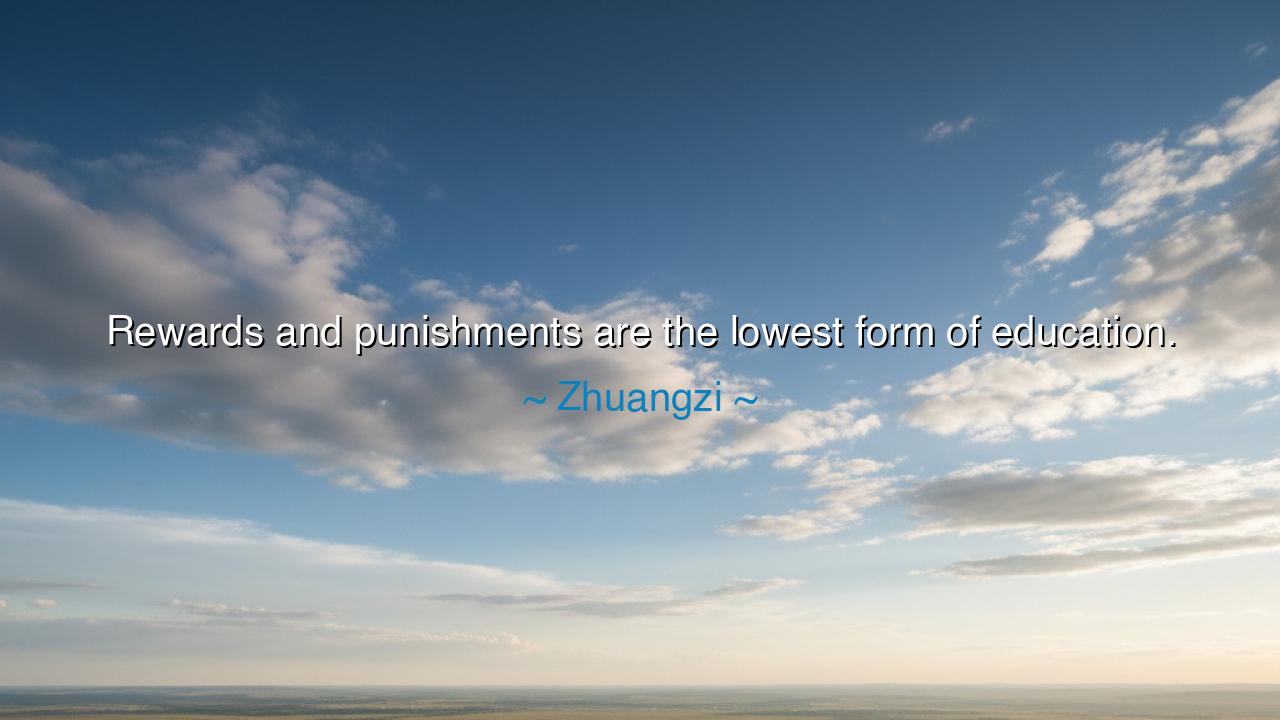
Rewards and punishments are the lowest form of education.






“Rewards and punishments are the lowest form of education.” So spoke Zhuangzi, the sage of ancient China, whose words flow through time like a quiet river of insight. In this saying, he reveals a truth that pierces the very heart of human learning: that to shape the mind through fear and desire is to treat the soul as a beast to be tamed, not as a spirit to be awakened. True education, he teaches, is not the art of control, but the art of awakening — of stirring the heart so deeply that it seeks virtue and wisdom on its own, without the lure of gain or the lash of fear.
In the kingdoms of old, rulers governed through rewards and punishments, believing that gold and suffering could mold the will of men. But Zhuangzi, walking his path of natural wisdom, saw the folly of this way. “If you lead with laws,” he might have said, “the people will learn to obey without understanding. But if you lead with virtue, they will follow with joy.” The heart that moves only for a prize is a prisoner of its own longing; the heart that avoids evil only from fear has never known goodness. Thus, the sage declares: to educate through threats and bribes is to teach without touching the soul.
Consider the story of Confucius, whose teachings Zhuangzi both respected and transcended. Confucius taught discipline, order, and ritual; but even he knew that virtue must spring from within. Once, when his disciple asked how to govern the people, he replied, “Guide them by virtue, keep them in line with ritual, and they will develop a sense of shame and righteousness.” This was the higher path — to awaken the conscience rather than command the body. Yet, as time passed, even Confucian teachings hardened into law, and rulers began to think that obedience was the same as wisdom. It was then that Zhuangzi’s laughter echoed through the ages, reminding all who would listen that the spirit cannot be ruled by chains, only by understanding.
This truth is as alive now as it was in the time of the ancients. In our own age, many still seek to motivate others with the same tools — reward and punishment. We promise children gold stars for good behavior, or punish them for mistakes, and call it education. We pay workers for performance, or threaten them with loss, and call it leadership. But such methods, though they achieve obedience, do not awaken love of learning, nor kindle integrity of heart. They breed calculation, not character. They teach how to win favor, not how to seek truth. The one who acts only to earn praise or avoid blame never learns who they truly are.
Let us instead look to the example of Socrates, who, like Zhuangzi, believed that learning must be born from within. He did not teach through lectures or laws, but through questions — planting seeds of doubt and wonder until his students could think for themselves. He never offered reward, nor feared punishment; even when condemned to death, he continued to teach by example. His education was not of compulsion, but of awakening — the same higher form that Zhuangzi spoke of, where knowledge becomes not something given, but something discovered. This is the education that transforms, that liberates, that gives birth to the soul’s own light.
Zhuangzi’s words also remind us that the human spirit is not a machine to be programmed, but a living flame to be nurtured. If you teach a person only what will earn them favor, they will spend their life chasing approval. But if you teach them to see beauty, to think deeply, to love truth for its own sake, they will walk their path with freedom and joy. The highest education does not produce servants, but seekers; not rule-followers, but sages. It teaches not what to think, but how to see.
Therefore, let this be your lesson: when you teach, or lead, or even guide yourself, do not rely on reward or punishment. These are tools for the weak and the fearful. Instead, appeal to the heart, the noble part of the human spirit that longs for truth and goodness. Inspire through example, awaken through dialogue, nurture through patience. Let your words be like sunlight — gentle, constant, and full of life — not like the whip or the coin, which only bend the body but never touch the soul.
For as Zhuangzi taught, the purpose of education is not obedience, but awakening. It is not to make the student fit into the world, but to help them rise above it. The wise teacher does not command; he inspires. The wise learner does not seek praise; he seeks wisdom. And when all fear and greed have fallen away, only understanding remains — quiet, eternal, and free.






AAdministratorAdministrator
Welcome, honored guests. Please leave a comment, we will respond soon